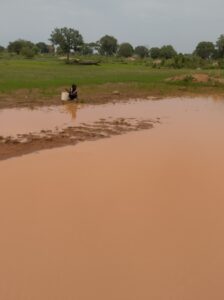By Scopas Bethuel
Under the scorching Aweil sun, a group of women stood smiling beside gleaming new water taps, their laughter rising above the hum of a solar-powered pump. For the first time in years, the women of Longwurkech and Dong Abel villages no longer have to trek for hours in search of water.
Last week, the German Development Cooperation (GIZ), in partnership with Welthungerhilfe (WHH), officially handed over two modern water yards to the communities of Nyalath Payam, Aweil Centre County. Each site is equipped with solar-powered motorized pumps, elevated water tanks, tap stands, and animal drinking troughs facilities expected to serve more than 600 households, or about 3,600 people.
“Before, we used to walk long distances and wait for hours at the borehole. Sometimes, we even fetched dirty water from the river,” said Nyandeng Akot, a mother of five from Longwurkech. “Now, clean water is just here. Our children are safe, and we can even grow vegetables.”
The new installations are more than just a source of clean water. They are the heartbeat of a broader plan to transform livelihoods, strengthen climate resilience, and reduce local conflicts over scarce water resources. With reliable access to water, families can now engage in off-season gardening, support tree nurseries, and provide for their livestock, ensuring better nutrition and income stability.
For many in Aweil, the lack of clean water has long been a silent crisis that has endangered health, burdened women and girls, and fueled community tensions. By improving access to water, the new facilities are also sowing the seeds of peace and cooperation.
To ensure sustainability, GIZ and WHH trained local communities and administrators in micro-catchment management teaching them how to conserve water, manage their environment, and protect against floods and droughts. Community-level water management committees have been formed to oversee the sites, maintain equipment, and mediate disputes
“Clean water means dignity, health, and opportunity,” said Ayen Achol Deng, GIZ Communications Officer. “But most importantly, it means empowerment communities taking charge of their resources and future.”

situation in the areas where the water yards were constructed
The water yard handover ceremony drew wide participation from the State Ministry of Water Resources and Irrigation, Aweil Centre County Agriculture Department, local administrators, and the beneficiary communities a sign of shared ownership and commitment to sustainability.
Germany, through GIZ, continues to support South Sudan in its path toward peace and development focusing on areas such as rural development, local governance, sustainable agri-food systems, gender equality, and climate resilience.
As evening fell over Aweil, the rhythmic splash of water filled the air — a sound that, for many, symbolized hope.
“This water gives us life,” said Makuach Chol, a community leader in Dong Abel. “We will protect it like our own child.”
The Deutsche Gesellschaft für Internationale Zusammenarbeit (GIZ) GmbH is a German federal enterprise supporting international cooperation for sustainable development. In South Sudan, GIZ implements projects on behalf of the German Federal Ministry for Economic Cooperation and Development (BMZ).



